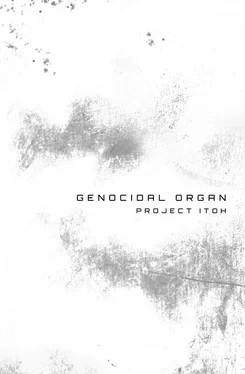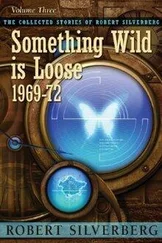Project Itoh - Genocidal Organ
Здесь есть возможность читать онлайн «Project Itoh - Genocidal Organ» весь текст электронной книги совершенно бесплатно (целиком полную версию без сокращений). В некоторых случаях можно слушать аудио, скачать через торрент в формате fb2 и присутствует краткое содержание. Год выпуска: 2012, ISBN: 2012, Издательство: Haikasoru/VIZ Media, Жанр: Старинная литература, на английском языке. Описание произведения, (предисловие) а так же отзывы посетителей доступны на портале библиотеки ЛибКат.
- Название:Genocidal Organ
- Автор:
- Издательство:Haikasoru/VIZ Media
- Жанр:
- Год:2012
- ISBN:9781421550886
- Рейтинг книги:4 / 5. Голосов: 1
-
Избранное:Добавить в избранное
- Отзывы:
-
Ваша оценка:
- 80
- 1
- 2
- 3
- 4
- 5
Genocidal Organ: краткое содержание, описание и аннотация
Предлагаем к чтению аннотацию, описание, краткое содержание или предисловие (зависит от того, что написал сам автор книги «Genocidal Organ»). Если вы не нашли необходимую информацию о книге — напишите в комментариях, мы постараемся отыскать её.
Genocidal Organ — читать онлайн бесплатно полную книгу (весь текст) целиком
Ниже представлен текст книги, разбитый по страницам. Система сохранения места последней прочитанной страницы, позволяет с удобством читать онлайн бесплатно книгу «Genocidal Organ», без необходимости каждый раз заново искать на чём Вы остановились. Поставьте закладку, и сможете в любой момент перейти на страницу, на которой закончили чтение.
Интервал:
Закладка:
My cover is that I’m in advertising, recently transferred over here to manage a big new account. Here to be a pioneer in the burgeoning interstitial market. To infest and infect beautiful Czech websites with opportunistic pop-ups of airbrushed models proclaiming their undying loyalty to a diet pill du jour. And these sorts of ads did, as it happened, have a tendency to appear on both English and Japanese blogs.
“Is that so? I have to admit I can’t really relate to that on a personal level, as I’ve never felt the compulsion to document my life for the whole world to read. But if what you say is true, I imagine that the web is drowning in a sea of words.”
“Did you ever keep a diary?” I asked, trying to find a way to relate the conversation to her.
“Hmmm … yes, I believe I did. Some time ago, though.”
“And if you don’t mind my asking, ma’am, where did you learn your English?”
“In the States. I studied linguistics,” she said.
“So you could say you’re a master of words?” I asked.
“Hardly. If I were so good with words I’d have ensnared a man or two to look after me by now, no? I studied the academic framework of language, not its sensual power.”
“Sure, you could describe Noam Chomsky as many things, but sexy is probably not one of them,” I joked.
“I don’t know about that. Not for most people, you’re right, but there are some oddballs in this world who feel the sensuous beauty in his work. Take me, for instance.”
Lucia smiled again. She sure liked to smile, I thought. And not just any old smile. Hers wasn’t the superficial smile of someone trying to make polite conversation. It was the smile of someone who loved words and loved communicating exactly what she meant in her heart. When she smiled she looked so much younger than the thirty-three-year-old she was. When she smiled, she could have probably passed for a teenage girl.
“Where were you based in the States?” I continued.
“I was at grad school in Massachusetts.”
“MIT?” I asked, and she nodded. “Wow! Impressive! I had no idea.”
Not true. I had every idea. It was my job to seem impressed by this piece of information, as if it were new to me, as if Intelligence hadn’t profiled this woman down to the last minute detail. It was my job as a spy to be able to pull off this sort of lie convincingly. Normally I could. Right now, though, I had no idea whether or not she was convinced.
“It’s not that impressive really. It happened to be the only school where I could continue my research in my field, and so that’s where I went.”
“Oh, really? What sort of research was that exactly?”
The conversation that had been flowing so naturally up until this point now hit a wall. This was one question too many for a casual conversation, evidently, although Lucia did her best not to show it.
Who’s asking? she must have wanted to say.
Instead, she chose her words carefully, blandly. “I suppose you could say it was mainly to do with how language can exert influence on people’s behavior.”
“You mean linguistic relativity? Like how Eskimos have over twenty different words for snow, and how the very existence of these words affects their worldview?”
“You mean the old Sapir-Whorf hypothesis? No, not quite.” Lucia smiled again. And truth be told I was relieved. Not so much because I was worried about her being suspicious, but because I didn’t like looking at her face when she frowned. She was a beautiful woman when she smiled.
“Actually, the story about the Inuit is something of an urban legend. The number of words that they apparently have for ‘snow’ seems to increase every time the story’s told. When Boas first reported his findings it was four, Whorf spoke of seven in his hypothesis, and the seven became ‘almost ten,’ ‘over ten,’ and so on and so forth, until you get ‘the Eskimos have a hundred different words for snow!’ being reported as fact in National Geographic . Scratch a little deeper, though, and you’ll see that they really just have a handful. Not that different from English, when you think about it: ‘snow,’ ‘sleet,’ ‘slush,’ ‘hail,’ and so on.”
This I didn’t know. I’d put up with plenty of dinner party snobs in my time, idly jibber-jabbering about how the Inuits have such different realities from us, don’t you know , and how their lives must be so much more real, y’know, being centered around snow and all that. And so I guess it was these idle gossips who were the carriers of the Eskimo meme from one middle-class dinner party to another.
I wondered how many words the Inuits would allegedly have for snow by the time the meme finally ran its course. A hundred? Two hundred? More?
“Sadly, real life tends to be a little less exciting than all that,” Lucia continued. “And contrary to popular belief, there seems to be very little correlation between language and people’s perception of reality. No matter where you’re born or where you grow up, reality is just that little bit too resilient to be buffeted about by language. The thought always comes before the language used to express the thought.”
“And yet I’m thinking in English right now.”
“Well, it might seem like that, because your reality is one that incorporates the English language into itself. But actually your thought process consists of a number of different factors, and language is just one of the tools at its disposal. Language is a subset of thought, if you will, not the other way around. Trying to argue that people think with language just because we have a keenly developed linguistic sensibility is a bit like saying that beavers have evolved to think with their teeth.”
“That’s an … interesting analogy.” I wasn’t being sarcastic. I had to acknowledge that there was a certain attractiveness to the idea that reality was determined by words and that it was the meanings that people attached to words that acted as a filter to construct their own versions of reality. But at the same time, something had always struck a false chord with me about this theory. I remembered back in high school our English teacher proudly relating the story of Eskimos having many different words for snow (twenty, was it, in that telling?) and feeling profoundly uncomfortable about this. After all, words were real, they were bundles of reality that existed in the outside world, independent from me. I remembered wondering how they could possibly influence my thought in that way when they weren’t really part of me.
“What sort of units do you imagine a mathematician or a theoretical physicist thinks in? When they first conceptualize their ideas?” Lucia asked me.
I answered that I supposed they would use more numbers and numerical formulae.
Lucia shook her head. “You would have thought so—but Einstein’s actually on record saying that it was always a visual image that came to his mind in the first instance. Other so-called geniuses have said similar things. That it’s actually a sort of diagram that comes to mind first, and it’s only by manipulating that diagram in their minds that they’re able to come up with formulae as the output.”
“That’s hard to believe. To understand, I mean. How do you visualize an imaginary number, or infinity for that matter?” I asked.
“Hard to believe for you or me. That’s because our realities are different from those genius scientists. So, you see, it’s probably more accurate to speak of different realities as being determined by thought processes, not language as such.”
“May I ask you a question?” I decided to press the point. “What are words to you ? If they’re not objects that determine our realities, then what are they there for?”
Читать дальшеИнтервал:
Закладка:
Похожие книги на «Genocidal Organ»
Представляем Вашему вниманию похожие книги на «Genocidal Organ» списком для выбора. Мы отобрали схожую по названию и смыслу литературу в надежде предоставить читателям больше вариантов отыскать новые, интересные, ещё непрочитанные произведения.
Обсуждение, отзывы о книге «Genocidal Organ» и просто собственные мнения читателей. Оставьте ваши комментарии, напишите, что Вы думаете о произведении, его смысле или главных героях. Укажите что конкретно понравилось, а что нет, и почему Вы так считаете.












